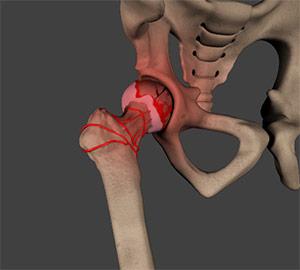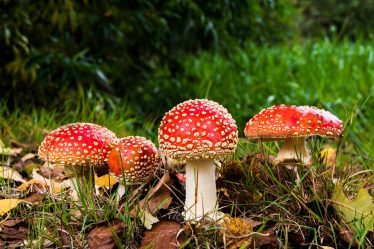
Avascular necrosis occurs when the blood supply to a bone is disrupted, leading to the death of bone tissue. This can be caused by a number of factors, including trauma, alcohol use, corticosteroid use, and certain medical conditions such as lupus and sickle cell anemia. In the early stages of avascular necrosis, there may be no symptoms. However, as the condition progresses, the affected bone may become painful and tender, and eventually collapse. The hip and knee are the most commonly affected joints, but avascular necrosis can also occur in the shoulder, ankle, and other bones.
Herbs for Avascular Necrosis
Here are a few herbs that have been shown to be effective:
- Ginger: This herb is well-known for its anti-inflammatory properties and has been used for centuries to help reduce pain and inflammation in the joints. Ginger can be consumed as a tea or taken in supplement form.
- Turmeric: Like ginger, turmeric is also known for its anti-inflammatory properties. Curcumin, the active ingredient in turmeric, has been shown to be effective in reducing joint pain and improving joint function.
- Willow Bark: Willow bark has been used for centuries to treat pain and inflammation. It contains salicin, a natural pain reliever, and has been used to treat a variety of conditions, including osteoarthritis.
- Boswellia: Boswellia, also known as frankincense, has been used for centuries to treat joint pain and inflammation. Its anti-inflammatory properties make it a useful herb for treating avascular necrosis.
- Devil’s Claw: This herb is native to South Africa and has been used to treat a variety of conditions, including arthritis and joint pain. Devil’s claw has anti-inflammatory and pain-relieving properties, making it a useful herb for treating avascular necrosis.
- St. John’s Wort: St. John’s wort has been used for centuries to treat a variety of conditions, including depression and anxiety. It’s also been shown to have anti-inflammatory properties, making it a useful herb for treating avascular necrosis.
- Arnica: Arnica is a popular herb used to treat a variety of conditions, including joint pain and inflammation. Its anti-inflammatory properties make it a useful herb for treating avascular necrosis.
- Yucca: Yucca is a desert plant that has been used for centuries by Native American tribes to treat a variety of conditions, including joint pain and inflammation. Its anti-inflammatory properties make it a useful herb for treating avascular necrosis.
It’s important to note that while these herbs have been used traditionally to help treat avascular necrosis, there is limited scientific evidence to support their use. As with any herbal remedy, it’s important to consult with a healthcare professional before using them, as they may interact with other medications or medical conditions.
Final Thoughts
Avascular necrosis can be a challenging condition, but with proper care and treatment, it can be managed. While conventional medical treatments are the primary method of treating avascular necrosis, herbs can be used as a complementary approach to care. If you’re considering using herbs to help treat avascular necrosis, it’s important to consult with a healthcare professional to determine the best course of treatment for your individual needs.





